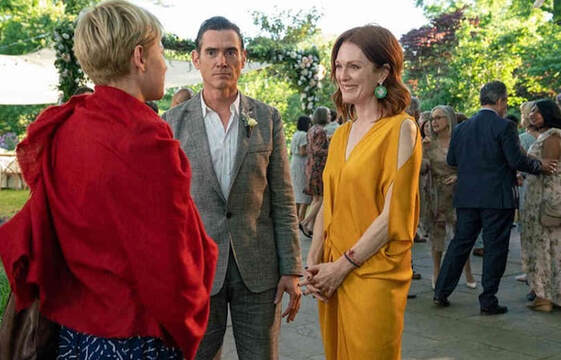|
An inordinate amount of drama happens within a week or two immediately after a wedding ceremony and celebration in the movie “After the Wedding” starring acting heavyweights Michelle Williams, Julianne Moore and Billy Crudup. Things start innocently and slowly enough as Isabel (Williams), an American manager of a struggling orphanage in Calcutta, learns that her non-profit may be the benefactor of large, ongoing donations from a corporation in New York. In order to seal the deal and secure the funding, the company explicitly needs Isabel to come in person for an interview. While Isabel is greatly relieved at the prospect of the much needed gift, she is reticent to leave her responsibilities at the orphanage, but the greater good prevails. Before long, she is in New York, put up in a swanky hotel and given an audience with the company’s CEO, Theresa (Moore) at the company’s headquarters.
From the time Isabel arrived in New York and back in Western clothing, you sense her discomfort with the setting and her situation. She clearly just wants to get in and out quickly, securing the generous grant money, and back to what has become her home and life. Being the seemingly demanding, powerful corporate executive that she is, Theresa makes it clear that she is in control of the situation, and she has other plans. Although their initial meeting is, in fact, quick, to Isabel’s dismay, it is only an initial meeting. Theresa fanes hesitancy to guarantee the orphanage’s selection, assuring Isabel that if she wants the money, she should expect a longer visit. Theresa seemingly wants to be convinced of the orphanage’s worthiness, while Isabel assumed it was a done deal. Isabel finds Theresa off-putting and demanding, questioning the true value of the grant juxtaposed against Theresa’s expectations. But until Theresa is available to meet on the matter again several days later, she insists Isabel come to her daughter’s wedding. It is while sitting in the back at the wedding, Isabel is horrified at realization of who the father of the bride is, Oscar (Cruddup). When he sees her, after the ceremony, he too is shocked and upset. The two acknowledge each other privately, sharing succinct pleasantries and questions, initially without letting Theresa or their daughter, Grace (Abby Quinn), know of their familiarity. This spark of mystery and drama turns into a flame during the wedding reception when other connections and motives are realized. Director Bart Freundich’s remake of the Danish film by the same name, switches up the gender roles in the American version, giving most of the heavy lifting to the female stars. Since Moore and Williams are two of the best actresses around, this proves to be a good choice. Seeing the two spar, so to speak, in one dramatic scene after another, proves to be the best, if not only, good aspect of the film. Williams maintains a taut unease and defiant, smoldering outrage throughout, while Moore is a more dynamic character due to unusual and unfortunate circumstances. Post-wedding, the mystery unravels rather quickly, but the pacing is achingly slow and the melodramatic twists and turns, not to mention, monologues and dialogues, are more tedious than necessarily intriguing. Too many revelations within such a short time frame, combined with a lack of character development for any of the principals, make for almost absurd drama. The character of Theresa comes the closest to being somewhat sympathetic and interesting, but only just. Crudup and Williams on the other hand, play it flat pretty much throughout, and Grace is spoiled, annoying and truly an underdeveloped character. In other words, “After the Wedding” is a dramatic bore, with a misappropriation of great talent. This maybe would have been more appropriately adapted as a mini series, giving space for the story to breathe, characters to grow, and the audience to connect. Instead we’re left with an odd and unfortunate combination of too much, too little, too slow and too dull.
0 Comments
It’s More Light Entertainment than Character Study, Comedy or Mystery
Even just a light, entertaining summer movie, like the newly released, “Where’d You Go, Bernadette,” gets a bit elevated thanks to the chameleon-like actor Cate Blanchett in the lead. Per usual, Blanchett is a joy to watch perform, and in this movie, that fact is no exception, but it may not be enough to make the movie an indie darling on one hand, or commercial bait with wide appeal on the other. Adapted from the wildly popular novel of the same title by Maria Semple, producers are no doubt banking on the book’s built-in audience to translate to box office appeal. They might end up disappointed- the book fans and the producers. “Where’d You Go, Bernadette,” is about a quirky, reluctant, if not resentful, suburban housewife who relocated with her tech engineer husband to outer Seattle 20 year earlier. They transplanted from Los Angeles where Bernadette Fox thrived as young, cutting edge architect on the rise. But when she was undermined with her last residential project, it left her flailing. As such, the couple headed North, allowing her husband, Elgie, played by Billy Crudup, to take advantage of a prominent position with Microsoft. Once there, then suffering a series of miscarriages that took its emotional toll, Bernadette became a shell of her former self. Eventually, they were able to conceive. Now 12, Bee ( Emma Nelson) is Bernadette’s world and they each other’s best friend. But that is not enough to smooth Bernadette’s rough edges and deep seated resentment. Bernadette is oblivious to her increasingly trying attitudes, while her husband is decidedly not, and contemplating drastic changes. Bernadette’s somewhat off-putting personality and constantly vocalized negative opinions are only outweighed by her aversion to people and somewhat abrasive manner. The notion of socializing with anyone beyond her family of three catapults her into anxiety and turmoil, and self-medication is a welcome option. She detests her fellow school mom’s and the community at large, most especially her uptight, annoying next door neighbor, a cliched character, played aptly by Kristen Wiig. They couldn’t be more opposite- to Bernadette’s give-a-shit attitude, Audrey throws herself wholly into school functions and the community, and she is obsessed with her house and yard. Both view each other as the bane of their existence. Audrey aside, there is no bigger target for Bernadette’s negativity than the city of Seattle itself, and the only thing neglected more than her marriage, is their monstrosity of a house. Although it was purchased many years ago when they moved to the area, it looks as though it hasn’t been touched for decades longer. The yard is full of weeds and overgrown berry vines, while the interior seems a hopelessly flawed and neglected as the exterior. Through it all, the one bright spot in the couple’s life is Bee. It is Bee’s exceptional academics, precarious ways, and endearing personality that convinces her parents that a trip to Antartica over the holiday break is a promise to her they should keep. Bernadette is horrified at the prospect of such an adventure, not to mention having to interact with other travelers. As a result, she enlists the aid of what she assumes is a practical online assistant. Through a series of events, post the trip decision, and the threat that she may, in fact, not be going on the family vacation or it may not happen for any of them at all, Bernadette escapes her imploding life and goes to Antartica solo. Along the way, she faces her fears, while finally recognizing the source of her angst, realizing she has suppressed her creativity and passion for far too long. In searching for his wayward wife, Elgie has a few revelations of his own. “Where’d You Go, Bernadette,” begins and ends with the same question posed to the protagonist- where are you going? This appropriately establishes it as a movie of self exploration and self discovery, but does not flesh out the character’s issues and insights, or the film’s theme, which should be layered and nuanced. The movie is directed by Richard Linklater, but definitely not a Richard Linklater film. He is known for truly clever independent films with observational characters and witty banter, such as “Dazed and Confused” and “Slacker,” and dramatic, experimental-type films, like “Before Midnight” and 2014 “Boyhood,” which earned him several well-deserved Oscar nominations. While “Bernadette” is entertaining and charming enough, especially for this time of year, it misses opportunities to be categorized as a character study film of any depth. |
AuthorPaula Farmer. Archives
June 2024
Film |


 RSS Feed
RSS Feed